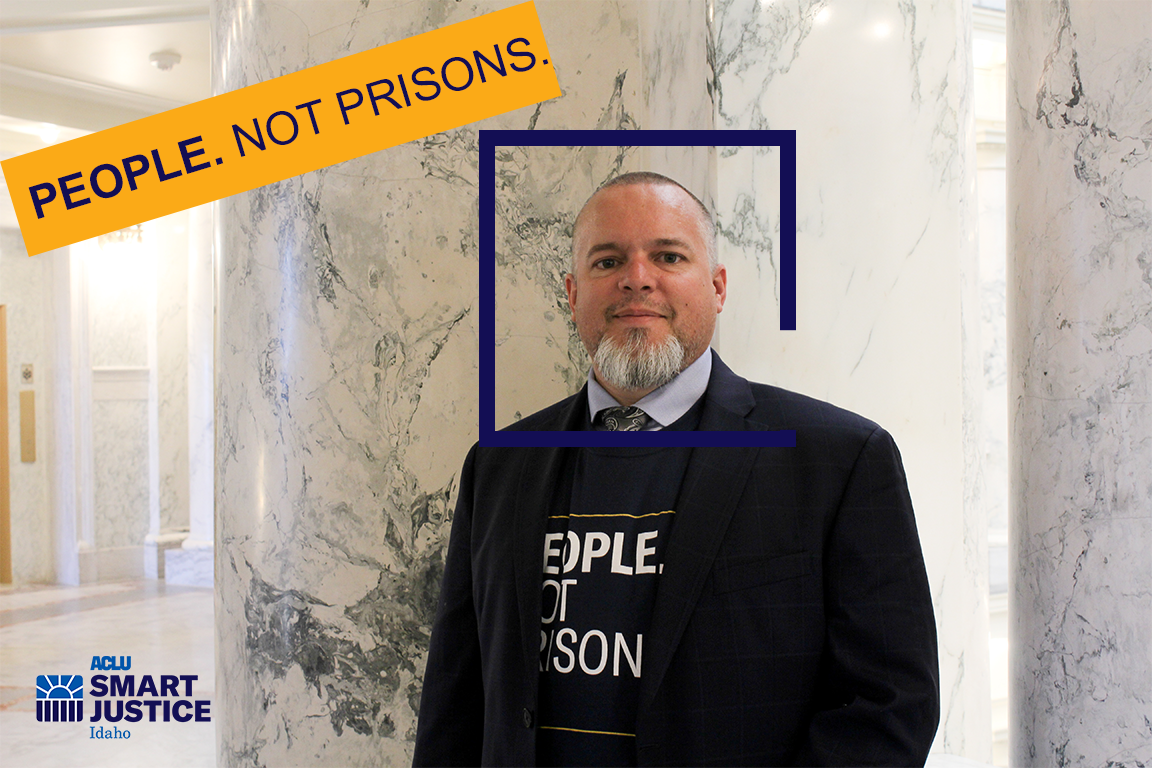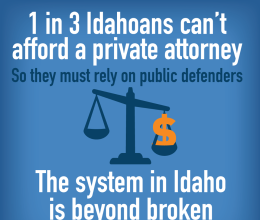

About the Smart Justice Idaho Stories Project
Too many Idahoans have been negatively affected by our criminal justice system--a system that still relies on out-of-date, "tough on crime" policies and punitive approaches to justice that don't work and aren't right for Idaho.
We believe in the power of Idahoans stories to shape the conversation around criminal justice reform in our state. Together, we can transform Idaho's criminal justice system to be more fair, equitable and rooted in community based solutions.
Jason
Jason was born in Moscow, Idaho in 1980. In 1994, when he was just 14 years old, he was charged with aggravated assault and voluntary manslaughter. He was first sentenced on his aggravated assault charge, and did prison time at St. Anthony’s. When he was 18 years old, he was granted time served for aggravated assault and was released from incarceration with 25 years of probation for the manslaughter charge. However, his freedom was short-lived because he experienced an alcohol relapse and returned to prison from 2004 to 2006. He is proud to say that he has been sober for 15 years now. A major part of his recovery has been giving back to his community and motivating others to make positive changes in their lives. When he’s not working, he spends his time volunteering for different organizations and doing public speaking at schools and prisons.
How did being incarcerated affect your family financially and emotionally?
My family has been greatly affected. I can talk for quite a while on how I’ve affected them and how my choices have affected their finances, their mindsets, and their grieving. They’ve been through a lot. I also have a 20-year-old son. The first time I met him, he was 2 years old, because I was in prison when he was born — prison and rehab. I was in a treatment facility when I met him. My parents brought him to visit me, and it was pretty awesome.
Did you feel that meeting your son changed your mindset?
I wish it did. I didn’t do well when I got out of treatment. As soon as I got out of treatment, I started drinking and using again. I got him when he was 3 years old and I was so excited to have him. Mainly excited because I was going to get my son, but I was also excited because I was going to stay sober for a month. I had him for a month. One of my rules was that I didn’t drink in my house, because I was on parole and my parole officers came over all the time. I promised myself I wasn’t going to drink, I wasn’t going to use, I was just going to hangout and be the best dad I could be. I made it two days sober. The second day I got an 18 pack of beer and I was pretty much drunk the whole time he was there. I met his basic needs, but I did not excel. When he left, I was very depressed and I kind of sunk further and deeper into my addictions. It wasn’t too much longer after that when I was arrested again.
Where there any programs in prison to help with your addiction?
There were several programs, unfortunately they were never consistent. But the last program I was in, therapeutic community, was a nine-month intense program that taught accountability, responsibility and taking care of your people. It was a very powerful program. I wouldn’t say that that was the driving force of my recovery, but it definitely had an impact on me and I know that it had an impact on many other people.
I had a spiritual experience that I can kind of contribute most of my attitude towards recovery to, so then when I got out, I asked for help. That’s the only difference between all the other times that I got out: I knew that I couldn’t make it on my own.
What was your experience going back into the community after being incarcerated, and how was your interaction with your friends?
I made new friends when I got out this time. I made friends that were making positive choices and I just hung out with the winners. That was the key to my success. I surrounded myself with people that were trying to do better for their lives and for their kids. Through that I was able to make it.
Was finding employment difficult?
Employment was definitely a struggle. I had one decent job before the job I currently have. When I got out of prison this last time, I was able to go to the work center before I got out. I was one of the fortunate ones. That really sets people up for success. I was getting paid $10 while I was incarcerated. The deal was that once I got out they were going to give me a raise, but they never followed through with their promise. At that time, my daughter was 2 years old, the same age that my son was the first time I met him. I decided to have her and her mom move in with me. Her mom was unemployed at the time and to support her and my daughter on $10 an hour was almost impossible. I left that job and walked in to another granite shop and spent five years there. That job helped me buy a house.
Later on, my other daughter was born and I also brought my son to live with us. I was raising my family, I had a house, and my dreams were becoming a reality. Unfortunately, the economy crashed and the granite industry crashed right with it. I decided to get my CDL in hope of getting a job at the Ada County Highway District. I applied for every job for four years and never got an interview. I’m not going to say that they were flipping over my application, because I put that I was a felon. I’m honest on everything, and I put that I was.
I decided to work for the temp agency that worked for the county. I worked there for eight months. Everyone in my crew liked me and appreciated my work ethic, but I still couldn’t get an interview. I decided to go to the upper management and complain, in a good way, about it. The next time I applied for a job, I got an interview and got a job. And I have been in the county for eight years now and I love it.
What would be something that you would like to tell or ask your lawmaker regarding the criminal justice system?
Idaho sentences someone to a period of time, a maximum period of time. If they are on probation or parole, they don’t get counted for that time. On some occasions that’s true, but sometimes it’s not. I was sentenced to 25 years of probation in 1998. If you count the time, in 2023 I should be topping out my sentence for 25 years, but my top out date currently is 2029. Somewhere along the line, I got six years added to my sentence. I think it’s important to rethink the maximum period of time.

